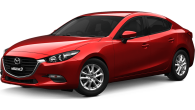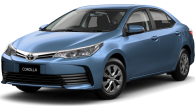In the ongoing quest for the most economical fuel, we pit oil against electricity.
It's pistols at dawn. Ford has thrown down the gauntlet to Australia's most popular brand, Toyota.
After years of sliding sales, the Blue Oval has decided that attack is the best form of defence and has targeted the market leader in its advertising.
One of the frontline weapons is the new Ford Mondeo, a car Ford boasts has "10 advanced technologies that are not available on the Toyota Camry".
Ford also claims the diesel version of the Mondeo is more efficient than Toyota's locally built Camry hybrid, using 5.1L/100km on the official fuel cycle compared to 5.2L/100km for the Toyota.
With the new models of both cars now arriving in showrooms, we put the claim under the microscope.
The test began where most daily commutes start, in nose-to-tail traffic.
They may film car ads on sweeping roads cut through breathtaking mountains but most owners will spend their time staring at the rear bumper of the car in front.
Hybrids do their best work in the city
We spent two hours in the morning peak on one of the country's busiest roads, before another hour in the suburbs and another three on a mix of country roads, including a quick blast through some twisty sections of road. Then we clocked up three hours of mostly freeway driving, with the cruise control dialled up when we could.
The Ford had its back against the ropes early. Hybrids do their best work in the city, where the electric motor can kick in at low speeds for short periods to cut fuel consumption. The heavier the traffic, the more fuel-efficient they can be.
They also have stop-start technology, which shuts down the engine completely when the car comes to a stop in traffic, saving more fuel. Finally, their electric motors capture kinetic energy as the car slows, storing it to allow for more petrol-free running at a later date.
Diesels on the other hand are made for the great outdoors. They do their best work on freeways, humming along at low revs and typically using roughly two-thirds of the fuel required by their petrol counterparts.
But if a diesel engine isn't driven far enough to reach optimum temperature, its fuel economy deteriorates significantly. Worse still, its particulate filter — which traps harmful emissions — doesn't operate properly at low temperatures. If you do mostly short trips in the city you won't warm the engine enough and the filter can become clogged, potentially resulting in expensive repairs.
Our test found that Mondeo used almost a third more fuel than the Camry on the city cycle.
The Mondeo's diesel was also far more intrusive in traffic. Off the mark, a trademark diesel rattle made its presence felt in the cabin. And the stop-start function — which is almost seamless in the hybrid Camry — makes a bit of a racket when the engine fires up again.
The Camry feels quicker off the mark, the low-rev torque of the electric motor giving it an edge over the first 30 metres off the mark. The Mondeo's diesel has a slight lag until the turbo spools up, which makes darting into gaps more problematic.
The Mondeo's extra grunt means it is a more relaxed cruiser
At our first refill, our testers agreed that the Camry was the better city commuter — quieter, more fuel efficient and therefore, cheaper to operate.
On the open road, the tables turned. The Mondeo's extra grunt means it is a more relaxed cruiser. While you're constantly reminded it's a diesel engine at low speeds, you hardly notice it's working when you're climbing hills or overtaking.
In contrast the Camry's engine, a silent partner in the city, makes itself known, revving higher on inclines and when overtaking. It feels as if it's being worked harder.
With not much to separate the two, we turned to recommended retail prices. The cheapest diesel Mondeo starts at $36,490, the cheapest Camry hybrid is $30,490. But that's not the end of the story, as the Toyota's on-road price is just $32,990 against the Mondeo's $40,970 — almost $8000 difference and Toyota throws in premium paint, which costs $450 on every Mondeo except the white ones.
Both Mondeo diesel and Camry hybrid are $4000 more than the petrol equivalent on the cheapest models, but the Toyota includes extra equipment for that premium.
Mondeo in theory would pay back the premium more quickly, though.
The Mondeo diesel uses 5.1L/100km on the official fuel test, compared with 8.2L for the petrol. At $1.32 a litre for diesel and $1.36 a litre for petrol (the average price of our refills), a base model diesel Mondeo driven the average 15,000km a year would cost $1010 to run, compared with $1673 for the petrol. It would take six years to recoup the premium. The Camry petrol version — which uses 7.9L/100km to the hybrid's 5.2L — would cost $1612 to run for a year, compared with $1061 for the hybrid — a payback period of seven years, three months.
Driving
The Mondeo is the driver's car. It feels more agile and composed through corners, with sharper steering and better balance. The drivetrain feels noticeably stronger and sportier. It's also quieter at highway speeds, although around town the diesel is less refined.
Inside
Both cabins are plain but smart, with the Mondeo's hatchback design and folding rear seats giving it up to 1356L of luggage space, compared with just 421L for the Camry — the boot is smaller to accommodate the battery. The Mondeo also wins the towing battle, with a 1600kg limit to the Camry's 300kg. The Camry edges it for rear legroom.
-wide.jpg)
Ford claims technologies that aren't available on the Camry. On the cheapest model, it trumps the Camry with nine airbags (including seat belt mounted items in the rear), satnav, active grille shutters for improved highway aerodynamics and electronic park brake. It can also dial 000 in an emergency and vary driving parameters for inexperienced drivers.
Camry fights back with a standard rear camera across the range and hybrid engine technology.
-wide.jpg)
Some of the more impressive technology on the Ford is reserved for more expensive models. The top of the range Titanium has auto parking, adaptive cruise, automatic low-speed braking, lane keeping aid, adaptive headlamps, Wi-fi hotspot and pre-collision assist with pedestrian detection. The top-line Camry has pre-collision safety, active cruise control, lane departure alert, automatic high-beam and blind-spot monitoring.
Toyota Camry 2015: Altise
| Engine Type | Inline 4, 2.5L |
|---|---|
| Fuel Type | Unleaded Petrol |
| Fuel Efficiency | 7.9L/100km (combined) |
| Seating | 5 |
| Price From | $12,870 - $17,160 |
| Safety Rating |
|
Verdict
In many ways the debate is moot. If you live in the city, the Camry's the better choice. If you have a long commute, want to tow or live in the country, the Mondeo is the pick. But with a get-in price of almost $8000 less and engine technology better suited to where most Australians spend their time — stuck in the traffic — the Camry edges ahead.
Toyota Camry
-wide.jpg)
Price: $32,990 drive-away
Safety: 5 stars, 7 airbags
Servicing Cost: $560 over 3 years
Engine: 2.5-litre 4-cyl plus electric motor, 151kW (combined), 213Nm (petrol), 270Nm (electric)
Transmission: CVT; FWD
Thirst: 5.2L/100km
Range: 1250km
Dimensions: 4850mm (L), 1825mm (W), 1470mm (H), 2775mm (WB)
Weight: 1575kg-1610kg
Spare: Full-size
Boot: 421L
Towing: 300kg
BY THE NUMBERS
CITY LOOP
Used: 5.95L (8.5L/100km)
Price: $1.41/litre
Cost: $8.38
COUNTRY LOOP
Used: 14.97L (7.4L/100km)
Price: $1.34/litre
Cost: $20.04
FREEWAY LOOP
Used: 14.13L (5.9L/100km)
Price: $1.32/litre
Cost: $18.58
OVERALL
Used: 35.05L (6.8L/100km)
Average price: $1.36/litre
Cost: $47.00
FORD MONDEO
-wide.jpg)
Price: $40,970 drive-away
Safety: 5 stars, 9 airbags
Servicing Cost: $1225 over 3 years
Engine: 2.0-litre 4-cyl turbo diesel, 132kW/400Nm
Transmission: 6-speed dual-clutch auto; FWD
Thirst: 5.1L/100km
Range: 1372km
Dimensions: 4871mm (L), 1852mm (W), 1482mm (H) 2850mm (WB)
Weight: 1645kg-1734kg
Spare: Full-size
Boot: 557L/1356L
Towing: 1600kg
BY THE NUMBERS
CITY LOOP
Used: 7.76L (11.1L/100km)
Price: $1.36/litre
Cost: $10.55
COUNTRY LOOP
Used: 13.55L (6.7L/100km)
Price: $1.30/litre
Cost: $17.60
FREEWAY LOOP
Used: 14.10L (5.9L/100km)
Price: $1.30/litre
Cost: $18.32
OVERALL
Used: 35.41L (6.9L/100km)
Average price: $1.32/litre
Cost: $46.47
.jpg)
.jpg)
.jpg)
.jpg)



.jpg)













.png)


.jpg)
.jpg)

.jpg)

